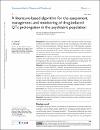A literature-based algorithm for the assessment, management, and monitoring of drug-induced QTc prolongation in the psychiatric population
| Author | Zolezzi, M. |
| Author | Cheung, L. |
| Available date | 2020-06-23T20:45:41Z |
| Publication Date | 2019 |
| Publication Name | Neuropsychiatric Disease and Treatment |
| Resource | Scopus |
| ISSN | 11766328 |
| Abstract | Background: Certain psychotropics and a number of other medications used to treat medical conditions in psychiatric patients can increase the risk of prolonging the corrected QT (QTc) interval on the electrocardiogram, which puts patients at risk of life-threatening ventricular arrhythmias such as torsades de pointes. Pharmacists are often consulted about medications which are known to prolong the QTc interval. Although this information is often accessible, advising how to identify, assess, manage, and refer psychiatric patients at risk for drug-induced QTc prolongation is more challenging. Objectives: The objective of this project was first to review the literature, which describes guidelines and recommendations for the assessment and management of drug-induced QTc prolongation, and then to design an algorithm to be used by pharmacists working closely with mental health professionals or who provide care to psychiatric patients. Methods: A review of the literature was undertaken. Predefined keywords were used to perform the database search in MEDLINE, EMBASE, and International Pharmaceutical Abstracts to identify reviews, reports and guidelines on the assessment, prevention and monitoring of drug-induced QTc prolongation with an emphasis on psychotropic medications and management in the psychiatric population. Results: The electronic database search retrieved 637 relevant citations. These were initially screened by title and all duplicates were removed. The abstracts were then reviewed for relevancy based on the inclusion/exclusion criteria. Additional citations were retrieved from the bibliography of the articles identified in the initial search. A total of 79 articles describing QTc prolongation in the psychiatric population were thoroughly examined, but only 31 articles were selected to guide the development of the algorithm. Conclusion: The literature-based algorithm developed provides a stepped-based approach for the assessment, monitoring, and management of drug-induced QTc prolongation in the psychiatric population. The algorithm may assist mental health clinicians in the decision-making process when psychiatric patients are prescribed medications known to increase the QTc interval. - 2019 Zolezzi and Cheung. |
| Language | en |
| Publisher | Dove Medical Press Ltd. |
| Subject | Algorithm Drug-induced arrhythmias Guidelines Mental Patients Protocol QT interval Torsades de pointes |
| Type | Article Review |
| Pagination | 105-114 |
| Volume Number | 15 |
Files in this item
This item appears in the following Collection(s)
-
Pharmacy Research [1440 items ]


